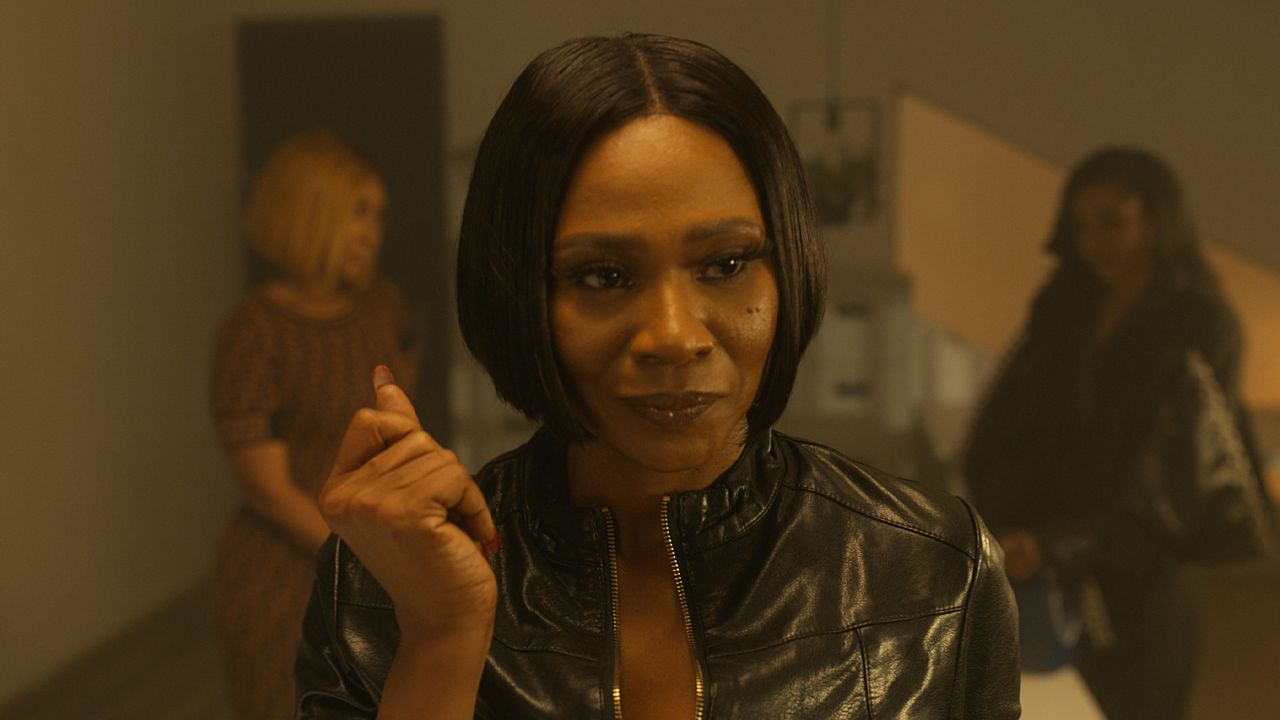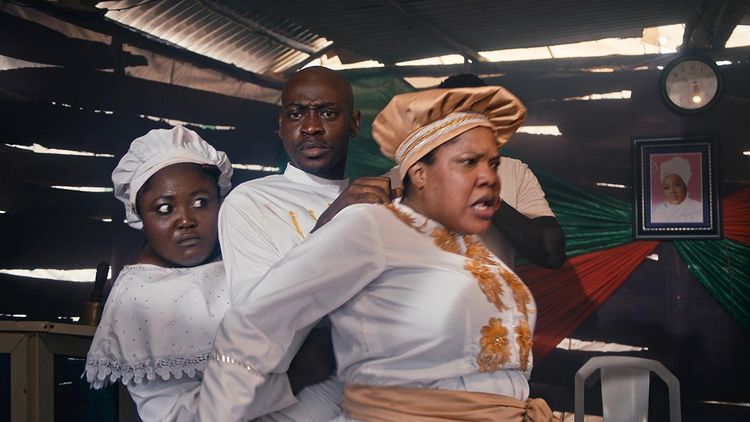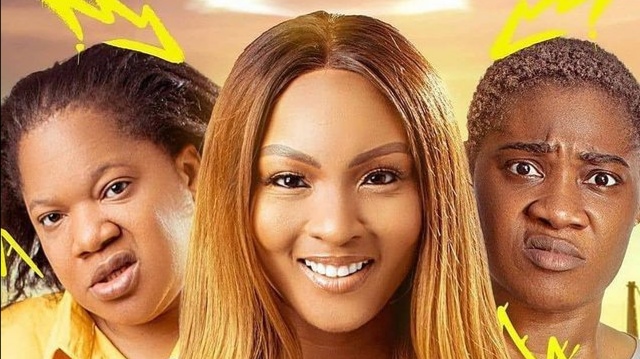What unifies all comedy is their theatrical roots. Go further and you will find that theatre itself is inextricable from religion. So comedy, in essence, is religious. Greek comedy originated from sexual, bawdy gatherings of Dionysian worshippers who wore giant phalluses in praise of the satyr patron and wine god, Dionysus. This ribaldry led Aristotle to pronounce comedy as a substandard medium of art and an inefficient manner of expressing serious subjects. Due to comedy’s potential to distract the viewer with cheap laughs to no end, it is safe to state that Aristotle, at the time, was right.
 ‘Glamour Girls’ Review: Nollywood Classic Remake Falls Short of the Glitz
‘Glamour Girls’ Review: Nollywood Classic Remake Falls Short of the Glitz
 The Best Nollywood Films of 2022, So Far
The Best Nollywood Films of 2022, So Far

Aristotle divides comedy into three categories; farce, romantic comedy, and satire. Farce is the lowest, oldest, and sadly, the Nollywood choice brand of comedy. Niyi Akinmolayan’s latest film, Prophetess, finds itself at the root of comedy: it merges religion and farce, that is, the lowest form of comedy at its most primitive state. This is not a good thing.
Neo-Nollywood battles with the problem of execution. The common trope is that these new Nollywood comedy films start with an interesting premise (Banana Island Ghost), proceed decently into the second act (Sugar Rush), and ruin the third act with an array of unnecessary plot addition, leading the film into an ambiguous and unsatisfactory denouement. The tragedy here is that of potential; we could postulate how the film could have been better in other numerous iterations.
There is an exhaustive routine and failure to Nollywood’s comedy but the short story is that they are all farcical, depicting a grand standstill of its cinematic evolution. What neo-Nollywood comedies do is aggrandize the traits of those loud gatemen characters of old Nollywood and situate them in Lagos Island. But Prophetess dips it a notch lower.
The overt placement of adverts opens the movie in its establishing shots. The film’s premise, although interesting, is quickly blown out of proportion and, like the crowd scenes, it lacks proper direction, and this inexplicable proliferation makes it difficult to write a proper synopsis. However, try we must: A prophetess makes two lucky guesses on camera and it is uploaded to the internet, prompting mass hysteria that leads people to her church and take her innocent words as golden and, as expected, trouble escalates. It would have been a decent movie if that was all, but it proceeds into a Gordian knot.
We must, at this point, ask ourselves careful questions about Nollywood’s acting. For Hollywood, it is easy to think of Meryl Streep, Anthony Hopkins, etc., but whose face comes to mind when we think of archetypal Nollywood acting? Here, we easily mistake intensity for skill. When an actor cries or performs anger, such actor appears better than the others who can’t conjure tears or expend choleric outbursts. This must be the prototype for acting in Prophetess because it feels as though all the actors were competing against being at rest.
 GreoH Studios Releases Official Character Posters for ‘Brotherhood’, Sets September 23 Release
GreoH Studios Releases Official Character Posters for ‘Brotherhood’, Sets September 23 Release

We know the characters that these actors are playing because we have seen them slightly tweaked in other movies, so we are neither surprised nor shocked by their dismal performances here. And this is why Toyin Aimhaku’s lisp—explained in the movie as a result of seizures from epilepsy—doesn’t seem like an integral layer to the plot or character, but a variation of the boisterous brand of plastic characterization peculiar to this actor. She plays the lead but there is nothing new to see here. This is yet another quality of farce, foolishly simplified characters that can be easily recognized by the audience. It is safe to term the acting in this movie as interchangeably mediocre. But performances like Kehinde Bankole’s, who played Labake, leaves one wondering what could have been.
We must return to farce as a means of social commentary. While this subgenre of comedy is known for its exaggerations and physicality, it is also a powerful means, as in Ernst Lubitsch’s To Be or Not to Be and Stanley Kubrick’s Dr. Strangelove or: How I Learned To Love The Bomb, to depict society’s failings. And this is ignoring farce’s theatrical contributions. To claim Neo-Nollywood comedy fails solely because of farce will be misleading and reductive. These new comedies merely focus on the physicality and preposterousness of farce and ignore its ability to present social frailties through humour.
As a result, we find ourselves imagining what this movie could have become. Prophetess could have been a genuine homage to Nigerian footballing history, to Ibadan’s footballing history, and to the great footballers from this city like Rashidi Yekini and Mutiu Adepoju, who were both mentioned but not properly attended to in the movie. Prophetess could have been a statement on abandoned national heroes. It could have shown the absence of proper care for young football talents. A statement on the abysmal state of grassroots football in Ibadan and the country at large. It could have been one of the aforementioned, and all of the aforementioned. This movie fails partly because the director lacked a genuine vision outside capitalistic profit. A testament to this, as it is with most films of this nature, is the sheer barrage of ads in the movie. Bigi products might as well have auditioned and gotten roles in this movie.

As previously mentioned, there is Kehinde Bankole, however, who shines in spite of the movie’s frailties. Although subject to the boisterousness dictated by the movie at certain times, she provides the most satisfying performance. In the scenes she shares with both serious and noisy characters, Kehinde Bankole soldiers through the film with genuine steadfastness to her character. We can see the slip and crack of an actor and character in other actors, but rarely do we doubt that Kehinde Bankole is Labake or vice versa. This should not be taken as a testament to the quality of the film’s directing. Evidence supports this claim because veteran actors such as Muyiwa Ademola and Ronke Ojo aka Oshodi Oke oscillate between mediocrity and horror; and Lateef Adedimeji, who’d perfected this same character in Sugar Rush couldn’t replicate his genius here; and there are numerous minor characters with distasteful performances. The acting fails from top to bottom, but Kehinde Bankole delivers, nonetheless.
The earliest farces were meant to be short, episodic, and have a single, specific location. But all arts evolve and intermingle and they travel and transcend themselves. Here we are in Nigeria grappling with a new cinematic wave of an “inferior” art form theorized by a philosopher in ancient Greece. The grandiose brand of comedy that this film stems from isn’t its problem. The movie, as mentioned elsewhere, lacks ambition beyond profit and denies its storytelling any genuine attention. This is resultant of the industry’s treatment of its grassroots writers, but that is a theme for another story. Right now, there is a blasphemy of the farce subgenre, and it is anchored by a Prophetess.
Rating: 4/10
Share your thoughts in the comments section or on our social media accounts.
Sign Up: Keep track of upcoming films and TV shows with Google calendar.
Side Musings
- …
- …
- …
- Our Nollywood Model Checklist tally
- An aerial shot of a road in Lagos:
- Instagram/Internet superstars (that cannot act):
- Sloppily placed ads:✔️ ✔️ ✔️ ✔️✔️
- Crass comedy:✔️
- A handful of standout actors:✔️
- A sprinkle of old Nollywood actors:✔️
- A novel idea ruined by poor execution:
Prophetess is available on Netflix from July 8th, 2022.







Yoooooooooo😭
I’m not surprised sha. It seemed like that kind of movie, tbh.
We may have spoken too soon about Toyin Aimakhu. 🤭
“What neo-Nollywood comedies do is aggrandize the traits of those loud gatemen characters of old Nollywood and situate them in Lagos Island. But Prophetess dips it a notch lower.”
Okay, forget the movie. This review is a Masterpiece. I’m not exaggerating but fusing history with a critical analysis is something I see everyday but I haven’t seen it like this. Because it’s Nollywood, I feel more connected. The writer wasn’t jst able to make me care more about the horrible state the industry is, he did it with such astuteness that I only find in the works of Owen Glieberman (whose ZSJL review yours just toppled on my 2021 list). I love this review.
🙏🏾 Glad you enjoyed it and that it gives you a good impression of the movie.